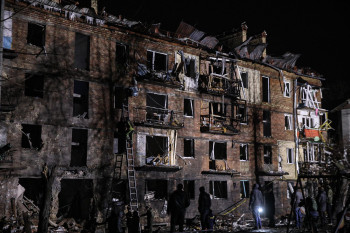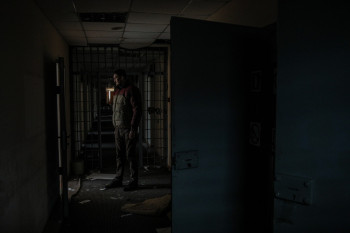Ukraine war latest: 6 million still without electricity after Russia's Nov. 23 missile attack

Key developments on Nov. 25:
- State grid operator says Ukraine to import electricity from EU.
- Ukraine bans fuel wood exports.
- Russian attacks on Ukraine's energy system have killed 77 civilians since Oct. 10, according to UN.
- Forbes estimates Russia has spent $82 billion on war with Ukraine since Feb. 24.
President Volodymyr Zelensky said that six million people still have electricity shortages three days after Russia launched a mass missile attack on Ukraine's civilian infrastructure.
"As of this evening, blackouts continue in most oblasts and Kyiv. In total, it affects over six million consumers compared to almost 12 million who were disconnected on Wednesday evening," he said.
Meanwhile, Zelensky criticized Kyiv authorities for "slacking" and poor provision of the so-called "invincibility centers"— specially equipped places where Ukrainians can charge their phones, warm up, and access the mobile internet network free.
"In fact, only the points deployed by the State Emergency Service and the railway are functioning properly. And other points still need to be worked on, to put it mildly," he stressed.
On the same day, Zelensky visited Vyshhorod, a suburb of Kyiv, after a Russian Nov. 23 missile strike killed seven people.
Kyiv Oblast Police Chief Andriy Nebytov said six people were killed, and 30 had been injured due to the attack.
Fuel wood exports banned amid Russia's attacks
The government banned exports because fuel wood is the primary resource for heating in many Ukrainian communities, especially those near the front line, Prime Minister Denys Shmyhal said on Nov. 25.
"Russian attacks on the energy system only increase the strategic importance (of fuel wood)," he said.
Moscow launched a large-scale missile strike on Ukraine on Nov. 23, primarily targeting energy infrastructure. The attack caused blackouts in all Ukrainian regions and parts of neighboring Moldova.
On Nov. 25, three Ukrainian-controlled nuclear power plants – Rivne, South Ukraine, and Khmelnytskyi – were reconnected to the power grid and are now operating to generate electricity for the country's needs.
Power had also been restored to the Chornobyl site, the statement reads.
The power units at the plants were automatically disconnected from the power grid following Russia's missile strikes on Ukraine.
On Nov. 25, Ukrenergo reported that Ukraine still has a 30% power deficit after massive blackouts.
Practically all big thermal and hydroelectric power plants in the country have been damaged, according to Volodymyr Kudrytskyi, the head of Ukraine's state grid operator Ukrenergo.
Russia has been targeting Ukraine's critical infrastructure since early October, admitting that the country's energy facilities are its primary goal.
To reduce Ukraine's energy deficit, state grid operator Ukrenergo is working on enabling the country to buy electricity from the European Union.
"Special mechanisms are needed to guarantee these imports since the price of electricity in Europe is higher than in Ukraine," said Kudrytskyi on Nov. 25.
He added that "hardly anyone" in Ukraine would want to buy electricity from Europe on general commercial grounds because of the high prices.
Kyiv used to export electricity to Europe but was forced to stop exports to stabilize its own energy system after Russia started regular attacks on its critical infrastructure on Oct. 10.
Ukraine's electricity system was integrated into the European grid in March, ending its electricity dependency on Russia and Belarus in the wake of Moscow's full-scale invasion.
Russia has spent a quarter of its annual budget on its war in Ukraine, Forbes estimate
Russia has spent a quarter of its annual budget, $82 billion, on a full-scale war with Ukraine, according to Forbes.
Forbes' estimate includes only direct costs that are necessary to conduct military operations, but it doesn't take into account defense spending or losses related to the economy, the publication says.
They calculated that Russia used 10,000 to 50,000 shells per day in the war, and the average price of a Soviet-caliber shell was about $1,000. It brings Russia's spending to more than $ 5.5 billion on artillery supplies alone.
Russia has also fired over 4,000 missiles at Ukraine. The average cost of one Russian missile is $3 million.
Russia has also lost 278 combat aircraft, with an average cost of $18 million, and 261 helicopters, with an average cost of $10.4 million.
The total losses of Russian aviation amount to $8 billion.
Attacks on Ukraine's energy system have killed 77 civilians since Oct. 10
On Nov. 23 alone, Russia's mass attack primarily targeting critical infrastructure killed at least eight civilians and wounded 45 more in Kyiv Oblast, according to the UN Human Rights Monitoring Mission in Ukraine.
The UN data said that 77 people were killed, and some 272 people have been injured by Russia's attacks on Ukraine's energy infrastructure since Oct. 10.
"Millions are being plunged into extreme hardship and appalling conditions of life by these strikes. Taken as a whole, this raises serious problems under international humanitarian law, which requires a concrete and direct military advantage for each object attacked," UN High Commissioner for Human Rights Volker Türk said.
Russia launched nearly 600 missiles on Ukraine between Oct. 10 and Nov. 23, Interior Minister Denys Monastyrskyi reported.












